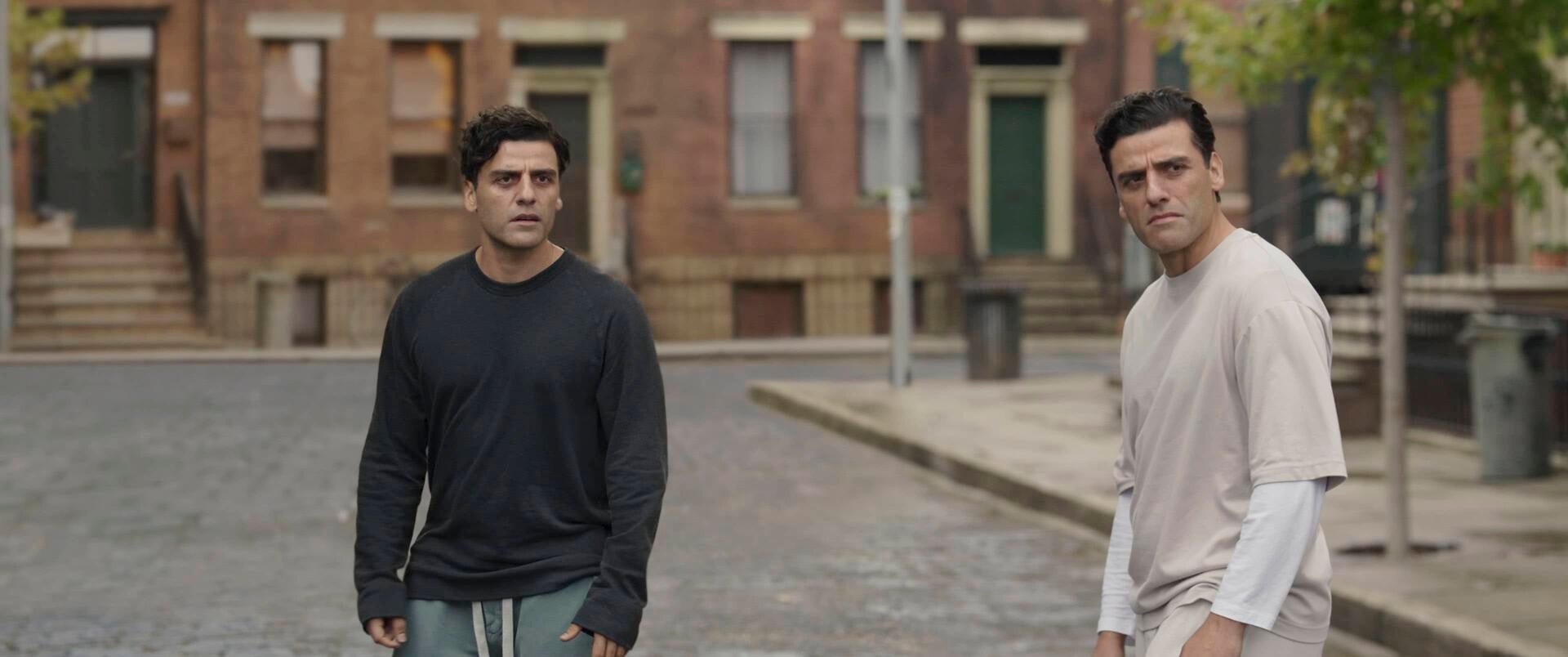This post includes spoilers for Moon Knight episode 5.
This week’s Moon Knight offers the clearest demonstration so far of the show’s interlocking strengths and weaknesses: A pair of wonderfully engaging performances from Oscar Isaac, propping up a rather messy and meandering concept.
Arthur Harrow’s evil plan is threadbare, giving Ethan Hawke surprisingly little to play with. The whole episode is framed around a “Was it all a dream??” mystery with very little tension, because we know Marc Spector isn’t actually in a psych ward. (As is often the case with this hoary old TV trope, the imaginary hospital scenes feel like a frustrating interruption from the story we actually want to see.) However this all adds up to more than the sum of its parts, allowing Oscar Isaac to shine as both Marc and Steven at once.
Last week’s talking hippo turns out to be Marc and Steven’s guide to the afterlife—but before they can move on to another realm, they must explore their memories. Or rather Steven must explore Marc’s memories, culminating in the unpleasant revelation that Steven is not a “real” person—he’s a secondary personality, created by Marc to escape his unhappy childhood. In more cynical terms, Moon Knight leans into two of Hollywood’s most overused superhero tropes: Origin stories and “trauma” as a catch-all motivation for everything.

Here, this involves Marc’s lingering guilt over his brother’s accidental death, which his abusive mother blamed on him. Inspired by an Indiana Jones-like fictional character, Marc invents Steven Grant as a childhood alter-ego, allowing “Steven” to take over his body when life gets tough. This explains Steven’s dodgy English accent.
As an adult Marc joins the military and then becomes a mercenary, gaining the Moon Knight powers during his darkest hour. By sheer coincidence, he attempts to kill himself inside Khonshu’s temple, where the god offers him redemption in the form of a holy mission. As Steven quite rightly points out, this was a horribly manipulative move. Marc never grew comfortable with killing people, even under Khonshu’s supposedly-moral guidance.
Some of this was signposted in earlier episodes, and comics fans already know about Moon Knight’s origin story and alternate personalities. (Jake Lockley, intriguingly, still hasn’t made an appearance.) Marc’s tragic past is boilerplate material for this kind of show, but it works thanks to the surprisingly tender relationship between Steven and Marc.
This version of Steven Grant is an original character co-created by Oscar Isaac. By casting him as a zany comedic protagonist who panics at the first sign of danger, the show provides a contrast with Marc’s more conventional role as a gritty action hero. But the things that make Marc “heroic”—his violence, his survival skills, his goal-oriented personality—are also his prison. Steven may be an embarrassing dweeb, but his vulnerability is an escapist fantasy for Marc. Steven is allowed to be afraid. Steven has a close relationship with his mother. Steven isn’t capable of macho toughness, and therefore isn’t beholden to its restrictions.
In earlier episodes, Marc is frustrated by Steven’s uselessness—something we can now interpret as a kind of self-loathing. But during episode 5’s trip down memory lane, we see Marc become more protective. Once the two alter-egos are split into separate bodies, he no longer sees Steven as his competition. Steven is more like a younger brother, a comparison with weighty connotations here. Marc knows that if Steven finds out the truth, his entire existence will be rendered moot. And, of course, his feelings will be hurt.
That’s exactly what happens in the episode’s final scenes, with Steven freaking out because his whole life is a lie, including his relationship with his mother. (As some viewers may already have noticed, his phone conversations with her were always noticeably one-sided.) Steven is understandably angry about the deception, but when he and Marc are attacked by zombies dragging them down into the underworld, Steven sacrifices himself so Marc can live. The episode ends with sweet, naive Steven freezing into a sand-statue while Marc returns to the living world—ready to defeat Arthur Harrow, another unwanted battle that he feels duty-bound to fight.


